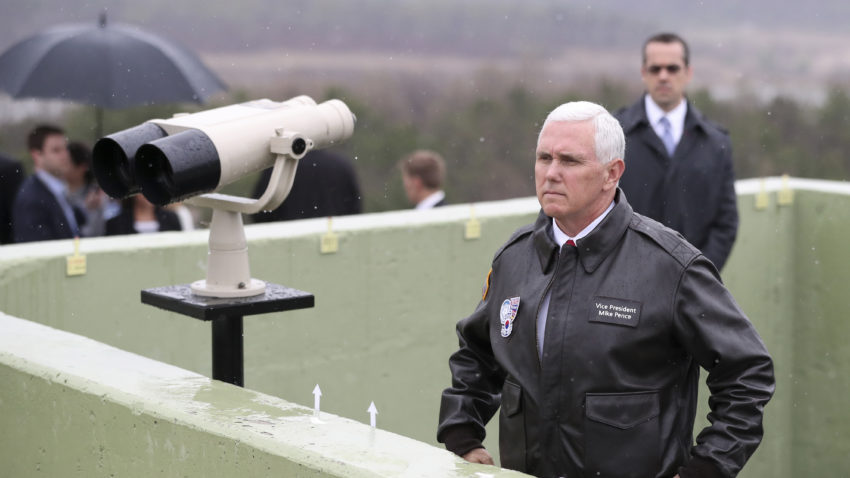Media Report

- Bloomberg reports: "U.S. Vice President Mike Pence encouraged China to take action against North Korea while he met with troops a day after Kim Jong Un's regime defied the Trump administration with a ballistic missile test. On a visit to the demilitarized zone between North Korea and South Korea, Pence said he was 'heartened' by early signs from China and hoped its leaders would 'use the extraordinary levers they have' to prod Kim into giving up his nuclear weapons and ballistic missiles. He repeated President Donald Trump's warning that the U.S. would act without China if necessary. 'Either China will deal with this problem or the United States and its allies will,' Pence said on Monday. 'We want to see change. we want to see North Korea abandon its reckless path.'...China isn't the key to resolving problems on the Korean Peninsula, Foreign Ministry spokesman Lu Kang told reporters in Beijing on Monday, repeating a call for all parties to avoid any provocations."
- Quartz comments: "Here's a sample of Trump 2016 rhetoric on the [currency] issue: 'If they don't solve that problem, we should be very tough on them on trade—meaning, start charging them tax or start cutting them off. You'd have China collapse in about two minutes.' But 2017 Trump seems to have left the proverbial stick back on the campaign trail. Part of the reason for that is a reality check: China is currently stabilizing its currency to protect its value in a way that economists say is helpful to global markets; its efforts to boost exports through a cheaper yuan fell off years before Trump announced his campaign. Even when China was goosing its currency, both the Bush and Obama administrations used the threat of official sanctions only as a bargaining chip, despite pleas from executives and trade unions in hard-pressed industries to impose punitive measures. Those administrations calculated that cooperation on other issues, including North Korea, was more helpful to international stability than a fight over trade terms...As Trump slides into Obama's shoes in the face of the North Korean threat, it's a reminder that geopolitical interest can quickly outweigh even Trump's unpredictable rhetoric."
- The Wall Street Journal reports: "In the wake of North Korea's failed missile test over the weekend, Trump administration officials stepped up pressure on China, saying the threat has reached an inflection point that demands new urgency. By framing China as the world's best hope for a resolution that doesn't involve military action, the U.S. aimed to raise the stakes for Beijing. 'It's really the consensus with the president, our key allies in the regions—Japan and South Korea in particular, but also the Chinese leadership—that this problem is coming to a head,' White House National Security Adviser Lt. Gen. H.R. McMaster said on ABC's 'This Week.' 'And so it's time for us to undertake all actions we can, short of a military option, to try to resolve this peacefully,' he said...The U.S. response also was restrained because Pyongyang's test, believed to be of a medium-range missile, was no more provocative than the last two conducted during Mr. Trump's presidency. 'We're trying to keep our response muted for a number of reasons, not the least of which is because it failed,' the U.S. official said."
Calendar
- 2017-04-14 China Warns of ‘Storm Clouds Gathering’ in U.S.-North Korea Standoff
- 2017-04-13 Trump Says China Won't Be Labeled a Currency Manipulator
- 2017-04-12 Xi and Trump Discuss Rising Tensions With North Korea
- 2017-04-11 Trump Says China Will Get Better Trade Deal if It Solves ‘North Korean Problem’
- 2017-04-10 China offers concessions to avert trade war with US
- 2017-04-09 Trade War Averted as China and US Agree 100-day Plan
- 2017-04-07 At U.S.-China summit, Trump presses Xi on trade, North Korea; progress cited
- 2017-04-06 Signs point away from Trump labelling China currency manipulator
- 2017-04-05 Trump and China: Ahead of Summit, Both Sides Try to Reset Volatile Relationship
- 2017-04-04 Trump-Xi meeting watched for clues of future relationship
News
- The Wall Street Journal U.S. Presses China on North Korea After Failed Missile Test
- Bloomberg Pence Visits North Korea Border, `Heartened' by China Moves
- The New York Times China's Economy Grows 6.9%, but Warning Signs Persist
- The Washington Post Chinese dissident says he will seek asylum in Taiwan
- The New York Times With Few Options, U.S. Doesn't Rule Out Talks With North Korea
- The Financial Times Former Trump aide advises Chinese tycoon on building contracts
- The Wall Street Journal China Gets Bailed Out by Its Consumers
- The Washington Post Changing Trump views toward Russia, China worry some allies
- Reuters Steel, stimulus drive China's strongest economic growth since 2015
- The Wall Street Journal Investors Pile Into Risky Chinese Debt
- USA Today Why China is beating the U.S. at innovation
- Reuters China says graft suspect on run in Canada gives self up
- The Financial Times China's Ant Financial raises bid for MoneyGram to $1.2bn
Commentary
- Quartz Donald Trump is making the same deal with China that Barack Obama did
- The Diplomat North Korea Crisis Hits Asia's Biggest Economies
- The Hill Trump juggles the foreign policy balls Obama dropped
- Salon Robert Reich: What's the true "Trump Doctrine" of foreign policy?
- The Wall Street Journal: China Real Time Report Economists React: China's Growth Accelerates, but for How Long?
- The Wall Street Journal: Opinion Trump's Art of the China Deal
- Forbes China's 'Best And Brightest' Leaving U.S. Universities And Returning Home
